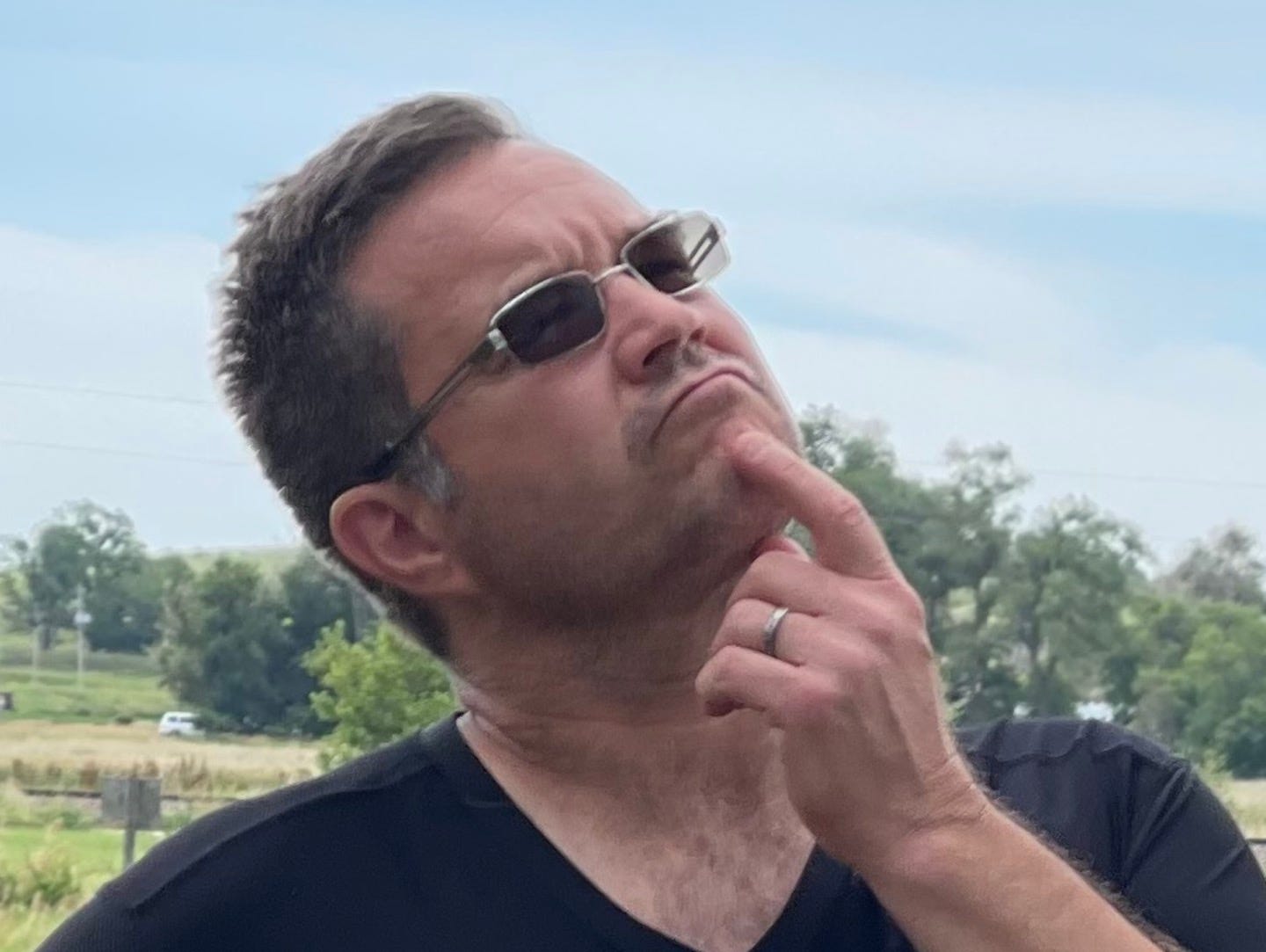Issue #1: "I Should, but Don't" by David Grubb
January 2025, STILL
Introduction by Casey Mulligan Walsh
As the lead editor for the inaugural issue of In a Flash, I was taken with so much about the writing in our selected piece, “I Should, but Don’t” by David Grubb. The urgency, vulnerability, and raw emotion grabbed me from the first breathless word and didn’t let me go until the very last. The writer’s restraint in using only the necessary details allows the personal to become universal. He takes risks in this piece, and it moved me deeply.
I was especially drawn to what, for me, was a relatable portrait of the arc of grief for so many of us who have lost people we’re sure we can’t live without, from the early days, when we imagine our loved one is still alive and may call us at any moment, to the ways our experience of grief changes over time, the way life grows around our loss, though it remains a part of us forever.
And now, our chosen piece for “STILL.”
“I Should, but Don’t” by David Grubb
I loathe posting in Facebook Page Remembering Damien. Of course, I should've done it years ago, and certainly on your birthdays, or holidays, or any time that makes sense, but the thing with this is it still doesn't make sense; and the third year has been one of the hardest for me, as if the first two years were designed to lull me to sleep or pacify my acceptance of what happened; let me act as if things are the same, act as if you're still down in Rhode Island chilling with the gang, pretend when I text you you'll answer, make believe like we spent a couple of the recent holidays together, shared strangely joyous moments on Facetime, or wonder if the OG (Olive Garden) ever changes, if you'd ever change, if there would come a day when you'd announce a marriage date, or a positive pregnancy test, or other crazy wild, yet perfectly normal news.
I can write novels, full length plays, short story collections, emails my employees mutter about because they’re too damn long, and endless drivel. I can tweet my ever-loving mind out, delve on Instagram occasionally, even pen some shyte in my daily journal using a nubbed pencil with no eraser. Somehow, I can’t post ILY on your damn page, poke you (if that’s still a thing), tag you with some dumb meme, share a picture of your siblings who’re still in mourning in their own little broken-hearted ways, or share a memory that FB insists we had ages ago. I wish I could say the guilt eats away at me like the weather or time erodes mountains, but I can’t.
Here's the thing, three years out from one of the worst days of my life, I'm still slogging along doing the best I can with what I have and loving those around me the best way I know how, and there's certainly a wide gaping hole in all of that, yet its filling in little by little with every spectacular moment that comes along, and the mundane ones, and the ones that wreck my train hurtling down the tracks, but when the gap is completely full again (unlikely, but possible) you'll still be the webbing holding all of it together, you'll still be the reason I smile, weep, growl, or become giddy for no apparent reason other than I'm thinking of something you did or said.
You'll still be the reason for my unreasoning, while being the reasoning for my reasoning, and you'll forever be missed, yet not forgotten, never forgotten, and I will always be a better person because you were my son—my first-born, pride and joy—the tiny spark that propelled me from boyhood to manhood, from selfish dolt to magnanimous Dad-hood, from not having a damn thing to having it all.
Author Spotlight
Casey: Your piece mesmerized me for many reasons, one of which is your decision to write in epistolary form to your late son. Can you tell me a bit about what led you to make that choice and why it worked so well for you (and for us as readers)?
David: I rarely write in epistolary form and use it like a surgical knife to cut and shape a particular piece (usually flash) because the style highlights the moment, increases urgency, and enhances the closeness. I read an early version of the piece, off the cuff, on memorial night at a place called Center for Grieving Children, which my youngest son has attended since Damien’s death, and it was well received. In that spontaneous moment I realized I was onto something more than the whim that started the piece, and it should be shared more widely.
Casey: The “container” in “I Should, but Don’t” is the narrator’s conflict over not posting on his son’s memorial Facebook page. How did you arrive at using this to frame the story you wanted to tell? Did you begin here, or did you experiment with other approaches before landing on this final format?
David: Since it began as an honest effort to amend a nonsensical promise that I was vaguely aware I’d made until I landed on his page at that moment in time, it stuck and worked perfectly. Of course, that rarely happens in my writing, and I simply thanked the writing gods and moved on to what wasn’t working at all. The original piece didn’t have the second paragraph and needed that part to flesh things out, and that took far more work. Flash can be hard, but when all cylinders are firing, it loves to mostly write itself.
Casey: On a lighter note, what’s your favorite pastime outside of writing? How do you get out of your head, as most writers need to do from time to time?
David: My second round of child rearing, started long before Damien died, keeps me far more occupied than any other path I might’ve chosen following some big changes in my life, which started around 2009. We bike, hike, ski/snowboard/snowshoe, paddle board/kayak, hit the beaches, camp, and travel. My younger kids are into many extracurriculars, which keep us way too busy as well. Basically, my current life structure gives me the necessary break from demonic thoughts, writing, and work (I’m the dedicated substitute teacher at a local tech high school) to come back to all my endeavors with great freshness.
What Our Co-Editors Had To Say
Leanne: The contrasts of this piece are what make it work so well. There's a lightness in the conversational tone and rambling sentences that juxtaposes the darkness of grief. It's deeply, personally self-reflective, yet universally understood. It has both depth and width, rhythm and harmony.
Cindy: The authenticity and urgency of the author’s voice make this piece special. Written without preamble or explanation, the title carries the weight of his pain, as he stands on the threshold remembering how he went “from not having a damn thing to having it all.”
Kate: The prose is modern in this short flash piece, and it weaves social media shorthand together with the timeless lament of a father for a son gone too soon. I especially loved the final line and its grief, which makes the loss of a beloved child even more unbearable.
Nina: I have not lost a child, but for anyone who is a parent, and even anyone who has suffered a loss, any loss, and is faced with this (ridiculous) but ubiquitous thing called social media and how it tugs at us both thankfully and damningly, this piece sings our dilemma. The beautiful turns and lines and emotions made my heart beat a little faster.
Author Bio
David Grubb, a retired Coastguard Warrant Officer, has creatively written since childhood, yet career/family always came first. He's changing that aspect of life and loving every minute. His work appears in Toasted Cheese, The Elevation Review, Everyday Fiction, and The Dead Mule School. He is the winner of Col. Darron L. Wright Award. Find David at www.agrubbylife.com and on Facebook or X.
Submission Calls
Enjoyed David Grubb’s essay? YOU could be our next featured author!
From January 1-15, please submit pieces on the theme of DREAMS.
From February 1-15, please submit pieces on the theme of GROWTH.
—No submissions in March—
From April 1-15, please submit pieces on the theme of LIGHT.
Before submitting, please refer to our Submission Guidelines page. (We’ll be linking to it in every new post, don’t worry!)
What’s Going On With Us
We were thrilled that In A Flash was profiled in Brevity Blog on December 18th. (If you discovered us through Brevity Blog, welcome— we’re so glad to have you here!) Editors Leanne and Cindy worked very hard to represent the group through a lighthearted yet informative conversation-style piece. We really enjoyed working with the Brevity Blog editors and were thankful for the opportunity to reach those readers.




Oh, David. This brought me to tears. I felt the yearning and the guilt. The push and the pull , of your grief, your longing, and the wanting to post and not. Thank you. Casey, what a great choice for Issue #1. I loved the conversation, and the commentary from the In A Flash Editors: Brava!
Ooof. So relatable. This one got me in the tear ducts.